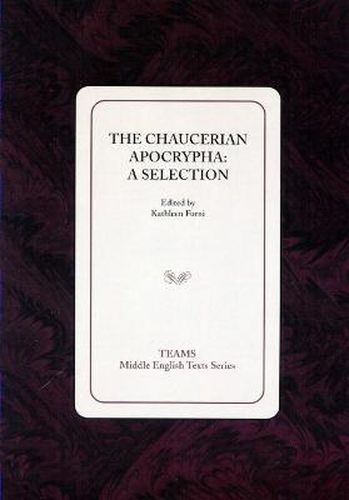Readings Newsletter
Become a Readings Member to make your shopping experience even easier.
Sign in or sign up for free!
You’re not far away from qualifying for FREE standard shipping within Australia
You’ve qualified for FREE standard shipping within Australia
The cart is loading…






The poems in this volume were prized and preserved because of their association with Chaucer’s name and have been, paradoxically, almost entirely ignored by modern readers for the same reason. Many of these pieces are worthy of study, not only in the context of Chaucerian reception, but also as specimens of the kinds of vernacular poetry that circulated in late medieval manuscripts and which remained in print, largely by the accidental virtue of their association with Chaucer, throughout the Renaissance and well into the nineteenth century. The various genres represented in this sampler (the dream vision, good counsel, female panegyric, mass parody, proverbial wisdom, lover’s dialogue, prochecy, advice to princes, elegiac complaint, courtly parody, and anti-feminist satire) attest to the diversity of late medieval literary tastes and to the flexibility of the courtly idiom. In the sixteenth century both Chaucer’s poetry and the diverse works with which it circulated appear to have continued to have been valued for their perceived courtly qualities. Chaucer’s early scribal and print editors also appear to have prized his sphere of influence (attested to by imitation, continuation, and emendation) and his adaptability to contemporary social and political needs.
$9.00 standard shipping within Australia
FREE standard shipping within Australia for orders over $100.00
Express & International shipping calculated at checkout
The poems in this volume were prized and preserved because of their association with Chaucer’s name and have been, paradoxically, almost entirely ignored by modern readers for the same reason. Many of these pieces are worthy of study, not only in the context of Chaucerian reception, but also as specimens of the kinds of vernacular poetry that circulated in late medieval manuscripts and which remained in print, largely by the accidental virtue of their association with Chaucer, throughout the Renaissance and well into the nineteenth century. The various genres represented in this sampler (the dream vision, good counsel, female panegyric, mass parody, proverbial wisdom, lover’s dialogue, prochecy, advice to princes, elegiac complaint, courtly parody, and anti-feminist satire) attest to the diversity of late medieval literary tastes and to the flexibility of the courtly idiom. In the sixteenth century both Chaucer’s poetry and the diverse works with which it circulated appear to have continued to have been valued for their perceived courtly qualities. Chaucer’s early scribal and print editors also appear to have prized his sphere of influence (attested to by imitation, continuation, and emendation) and his adaptability to contemporary social and political needs.